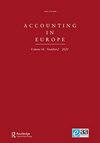The Development of EPSAS: Contributions from the Literature
IF 4.3
Q1 BUSINESS, FINANCE
引用次数: 24
Abstract
Abstract EPSAS are being considered in the EU context where a need for harmonisation in Governmental Accounting (GA) has been recognised as important to increase the reliability of sources of information to the National Accounts (NA) figures. However, GA and NA are two different and parallel reporting systems at national level, even if, within the European context, EPSAS intend to contribute for their convergence. The relationship between GA and NA has been recurrently addressed in the literature over the last two decades, with professionals being more proactive while academics have been more reactive in the debate. Several issues have been raised. This paper recaptures and revises these issues, synthesising academic and practitioner literature, archival documents and reports of EU working groups, from 1996 to 2018. The analysis highlights the more controversial areas, and those that seemed already settled but yet are now, within the context of EPSAS development, being raised again. Specifically, the paper calls attention to (1) the need to manage between two different conceptual frameworks of GA and NA; (2) the importance of interdisciplinary collaboration between the professionals involved, namely accountants, public administrators and statisticians; (3) the role of budgetary accounting and the alignment required between reporting in GA and NA, reducing and harmonising adjustments to be made when translating data from one into the other; and (4) the need to address auditing issues, as EPSAS on their own may not be enough to ensure reliability of the information reported.EPSAS的发展:文学的贡献
EPSAS正在考虑在欧盟的背景下,需要在政府会计(GA)的协调已被认为是重要的,以提高信息来源的可靠性国民账户(NA)的数字。然而,GA和NA在国家层面上是两个不同的并行报告系统,即使在欧洲范围内,EPSAS打算为它们的趋同做出贡献。在过去的二十年中,GA和NA之间的关系在文献中得到了反复的讨论,专业人士在辩论中更加积极主动,而学者则更加被动。提出了几个问题。本文回顾并修正了这些问题,综合了1996年至2018年欧盟工作组的学术和实践文献、档案文件和报告。分析强调了更有争议的领域,以及那些似乎已经解决,但现在在EPSAS发展的背景下又被提出的领域。具体而言,本文需要注意(1)在GA和NA两个不同概念框架之间进行管理的必要性;(2)会计、公共管理人员和统计人员等相关专业人员之间跨学科合作的重要性;(3)预算会计的作用以及在通用会计和通用会计中报告的一致性,减少和协调在将数据从一种转换为另一种时需要进行的调整;(4)解决审计问题的必要性,因为EPSAS本身可能不足以确保所报告信息的可靠性。
本文章由计算机程序翻译,如有差异,请以英文原文为准。
求助全文
约1分钟内获得全文
求助全文

 求助内容:
求助内容: 应助结果提醒方式:
应助结果提醒方式:


